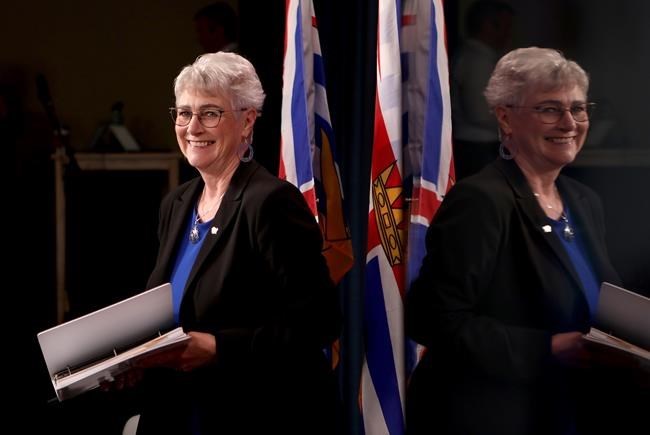VICTORIA ‚Äî A record-high $966 million in wildfire spending and lower natural gas prices have combined to add $2.5 billion to British Columbia's projected deficit for this fiscal year, pushing that number to $6.7 billion.¬Ý
Finance Minister Katrine Conroy said during the release of the province's first-quarterly report for 2023-2024 that the cost for responding to –°¿∂ ”∆µ's record-breaking wildfire season was $762 million more than planned for in Budget 2023.
That extra cost was the second-largest contributing factor to the expansion of the forecasted deficit, behind lower natural gas royalties that fell $1.2 billion below budget projections.
"We had already anticipated the price to decline from last year's high," Conroy said. "However, we didn't anticipate it to drop as quickly as it did."
British Columbia originally expected to receive $2 billion in natural gas royalties this year after collecting $2.3 billion in fiscal year 2022-2023.
The latest projection now forecasts the revenue from royalties to be at $837 million for this year.
Conroy said a warmer winter in Europe and the United States earlier this year, as well as stockpiles of natural gas globally, contributed to the commodity's price falling precipitously after spiking in the spring and summer of 2022 due to the war in Ukraine.
Despite the sizable deficit, she said the province will not cut services, implement new fees or add taxes to balance the budget, noting that she believes that maintaining government spending is crucial to economic growth.
"In challenging times, previous governments pull back on supports, increasing fees and cutting services," Conroy said. "That's the wrong approach. No matter what, we will continue to protect people and invest in services they need because it's the people who build our province and our economy."
Overall, the latest projections show the provincial economy performed better than expected, with economic growth forecast at 1.2 per cent this year, higher than the 0.4 per cent originally anticipated.
But uncertainty over high interest rates — which Conroy said are expected to remain at elevated levels for longer than expected — as well as weaker demand globally for exports, and continued inflationary pressures are anticipated to place more pressure on growth.
The new projections show economic growth to reach 0.8 per cent next year, just over half of Budget 2023 expectations.
The quarterly report said there are a number of statistics that demonstrated –°¿∂ ”∆µ's "resilient" economy, such as "relatively low" debt levels, high population growth and a housing start increase of 15.5 per cent so far this year.
But the report also highlighted ongoing concerns such as "modest" consumer spending and mixed housing sales activity.
Conroy said –°¿∂ ”∆µ's diverse economy and strong financial planning puts the province in a good position to weather global uncertainties like inflation and high interest rates.
When asked if the province is anticipating wildfire spending to push $1 billion every year moving forward, given the onset of climate change, Conroy said she hopes it's not the case.
"It is a difficult situation, but we're hoping with the mitigation that we do, the work we do, we can bring those numbers down."
The minister said in February that there would likely be deficits "in the coming years" and that "things probably aren't going to be quite as rosy" as last year, when the province had a surplus of $704 million.¬Ý
The province is slated to provide the second-quarter fiscal update in November before presenting Budget 2024 on Feb. 22 of next year.
‚Äî By Chuck Chiang in Vancouver¬Ý
This report by The Canadian Press was first published Sept. 27, 2023.
The Canadian Press




